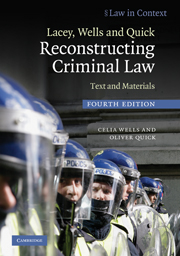Book contents
- Frontmatter
- Contents
- Preface
- Table of cases
- Table of statutes
- Section I Approaching Criminal Law
- Section II Law, Order and Security
- Section III Interpersonal Violence; Drugs and Alcohol Abuse; Offence Preparation and Participation
- Section IV Property and Propriety
- Section V Regulating Sexuality and Bodily autonomy
- 14 The Social Construction of Sexuality and Bodily Autonomy
- 15 Sexual Violence
- 16 Regulating Sexuality
- 17 Criminalising Healthcare Choices
- Section VI Making a Killing
- Bibliography
- Index
- References
14 - The Social Construction of Sexuality and Bodily Autonomy
from Section V - Regulating Sexuality and Bodily autonomy
Published online by Cambridge University Press: 05 June 2012
- Frontmatter
- Contents
- Preface
- Table of cases
- Table of statutes
- Section I Approaching Criminal Law
- Section II Law, Order and Security
- Section III Interpersonal Violence; Drugs and Alcohol Abuse; Offence Preparation and Participation
- Section IV Property and Propriety
- Section V Regulating Sexuality and Bodily autonomy
- 14 The Social Construction of Sexuality and Bodily Autonomy
- 15 Sexual Violence
- 16 Regulating Sexuality
- 17 Criminalising Healthcare Choices
- Section VI Making a Killing
- Bibliography
- Index
- References
Summary
The state, through law, exercises a significant influence over bodily autonomy in general and the construction of sexuality in particular. Laws regulate, for example, the age of consent to sexual intercourse, and the nature of consent required for medical examinations, cosmetic and ritual procedures such as tattooing and circumcision, and for procedures in relation to childbirth and reproduction. Criminal laws embody norms of sexual practice and regulate the right of citizens to engage in sexual activity which is not consistent with those norms. Legal interventions in these areas inevitably confront the blurred social boundaries between ‘legitimate’ and ‘illegitimate’, ‘normal’ and ‘abnormal’ conduct, and raise in a particularly vivid way questions about the proper scope of criminal law.
Steven Box 1983 Power, Crime and Mystification (Tavistock), p. 121
Nearly one hundred years ago, Durkheim wrote that suicide is ‘merely the exaggerated form of common practices’ and that it ‘appears quite another matter once its unbroken connection is recognised with acts, on the one hand of courage and devotion, on the other of imprudence and clear neglect’. This relatively simple, but radical idea – that there is considerable overlap between deviance and convention, rather than the former being distinctly different and opposite to the latter – inspired later generations of sociologists…[A] similar lesson can be obtained from considering how ‘normal’ sexual encounters merge imperceptibly into sexual assaults of which rape is the most serious, and how the former provide the ingredients out of which the latter can emerge.
- Type
- Chapter
- Information
- Lacey, Wells and Quick Reconstructing Criminal LawText and Materials, pp. 477 - 488Publisher: Cambridge University PressPrint publication year: 2010

